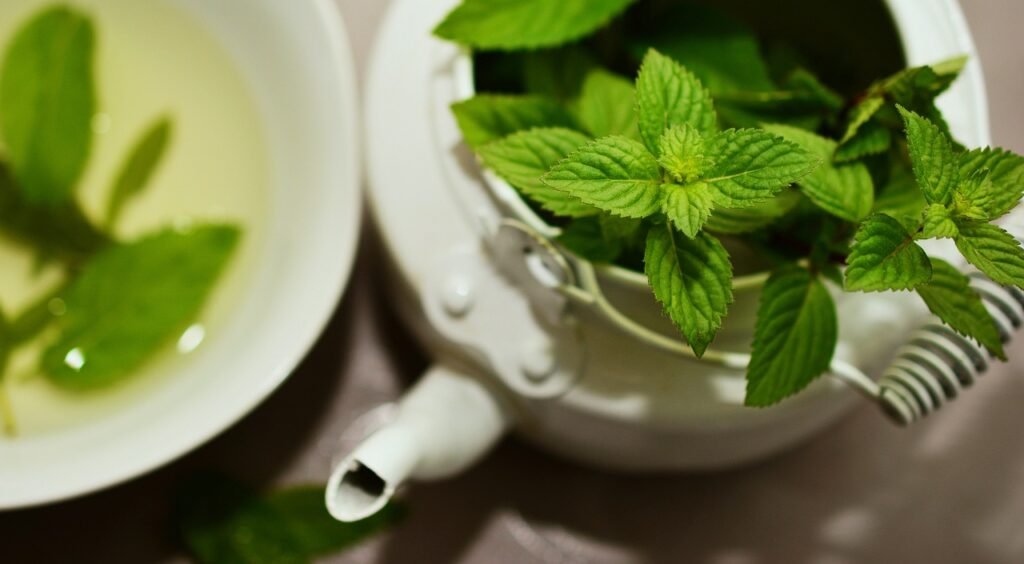This post may contain affiliate links. Which means I may receive a commission for purchases made through links, at no cost to you. I will only recommend products that I have personally used. Learn more on my Disclaimer Page and Privacy Policy Page
Embrace Freshness: The Surprising Health Benefits of Mint
In the realm of herbs, mint stands out not just for its refreshing taste, but also for its numerous health benefits. From its invigorating aroma to its versatility in culinary and medicinal applications, mint has been cherished for centuries. Let’s dive into the world of mint and uncover its remarkable benefits for our well-being.
1. Digestive Aid: One of the most well-known benefits of mint lies in its ability to aid digestion. The menthol in mint helps to relax muscles in the digestive tract, relieving symptoms of indigestion, bloating, and gas. A simple cup of mint tea after a heavy meal can work wonders in soothing the stomach.
2. Respiratory Support: Mint’s cooling properties make it a natural decongestant, offering relief from respiratory issues like congestion, coughs, and sinusitis. Inhaling the vapor of mint leaves steeped in hot water can clear nasal passages and promote easier breathing, providing comfort during colds or allergies.
3. Oral Health: Mint’s antimicrobial properties make it a valuable ally in oral hygiene. It helps to freshen breath, combat bacteria that cause cavities and gum disease, and soothe oral inflammation. Incorporating mint leaves into homemade mouthwashes or chewing on them directly can contribute to a healthier mouth.
4. Stress Relief: The aroma of mint has a calming effect on the mind and can help alleviate stress and anxiety. Whether enjoyed as a cup of mint tea or as an essential oil diffused in the air, mint can promote relaxation and mental clarity, providing a refreshing break from the pressures of daily life.
5. Skin Care: Mint offers benefits for the skin, thanks to its anti-inflammatory and antiseptic properties. It can help to soothe irritated skin, reduce acne, and provide relief from insect bites or sunburns. Incorporating mint into homemade skincare products or using mint-infused creams and lotions can promote healthier, clearer skin.
6. Weight Management: Mint’s refreshing flavor can aid in weight management by curbing cravings and promoting better digestion. Whether consumed as a tea, added to water, or included in meals, mint can contribute to a feeling of fullness and satisfaction, potentially reducing the urge to overeat.
7. Cognitive Function: Some research suggests that the aroma of mint may have cognitive-enhancing effects, improving memory, alertness, and cognitive function. Whether diffused in the air or incorporated into personal care products, mint’s invigorating scent can help to awaken the mind and enhance focus.
Incorporating mint into your daily routine is simple and rewarding. Whether you choose to enjoy it as a refreshing tea, add it to your meals for a burst of flavor, or harness its aromatherapeutic benefits, mint has much to offer in promoting overall well-being. So, why not embrace the freshness and vitality that mint brings into your life?
How to eat mint everyday!
Incorporating mint into your diet is not only delicious but also offers numerous health benefits. Here are several ways you can enjoy mint:
- Fresh Leaves: Simply pluck fresh mint leaves and add them to salads, sandwiches, or fruit salads for a burst of flavor and freshness.
- Mint Tea: Steep fresh or dried mint leaves in hot water to make a soothing and refreshing tea. You can enjoy it hot or cold, sweetened with honey or sugar, or mixed with other herbs like chamomile or lemon balm.
- Smoothies: Add a handful of fresh mint leaves to your favorite smoothie recipe for a refreshing twist. Mint pairs well with fruits like berries, pineapple, and citrus fruits.
- Infused Water: Add fresh mint leaves to a pitcher of water along with sliced cucumbers, lemon, or berries for a refreshing and hydrating drink.
- Herb Butter: Mix finely chopped mint leaves into softened butter along with a pinch of salt and spread it on bread, crackers, or use it to top grilled vegetables or meats.
- Mint Sauce: Combine chopped mint leaves with vinegar, sugar, and a pinch of salt to make a classic mint sauce, perfect for serving with lamb dishes.
- Desserts: Use mint to flavor desserts like ice cream, sorbet, or chocolate dishes. You can also garnish cakes, pies, or fruit salads with fresh mint leaves for a pop of color and flavor.
Chewing on mint leaves can offer several benefits:
- Freshens Breath: Mint’s natural antibacterial properties help kill odor-causing bacteria in the mouth, leaving you with fresher breath.
- Aids Digestion: Chewing on mint leaves stimulates the production of saliva, which contains enzymes that aid digestion. It can help alleviate symptoms of indigestion, bloating, and gas.
- Relieves Nausea: Mint has a soothing effect on the stomach and can help alleviate nausea and vomiting. Chewing on mint leaves or drinking mint tea may provide relief from motion sickness or morning sickness.
- Boosts Alertness: The aroma of mint has been shown to have a stimulating effect on the brain, increasing alertness and improving cognitive function. Chewing on mint leaves may help improve focus and concentration.
- Soothes Oral Irritation: Mint’s anti-inflammatory properties can help soothe oral irritation caused by conditions like mouth ulcers or inflammation of the gums. Chewing on mint leaves may provide temporary relief from discomfort.
- Provides Antioxidants: Mint is rich in antioxidants, which help protect the body from damage caused by free radicals. Chewing on mint leaves allows you to absorb these beneficial compounds directly into your system.
- Promotes Relaxation: Some people find that chewing on mint leaves has a calming effect, helping to reduce stress and anxiety. The act of chewing can also be soothing and may help promote relaxation.
Overall, chewing on mint leaves can be a simple and natural way to freshen breath, support digestion, and promote overall well-being.

